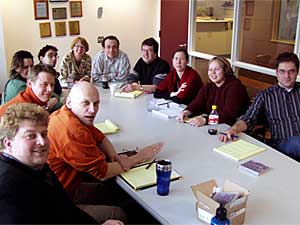|
Audio
Photos
More from MPR
Resources
|
January 21, 2005
 |
| The 89.3 staff. (MPR Photo/Bob Collins) |
St. Paul, Minn. — MPR says the new service will feature acts ranging from Ray Charles to the electronic pop group the Postal Service, but will also spotlight the work of local and regional artists. There will also be news updates as well, but in a more conversational tone than the typical public radio newscast.
The staff includes on-air alumni of Cities 97, the old Rev 105, community radio station KFAI and Radio K, the University of Minnesota's student station. Names include Mary Lucia, Bill DeVille, and Mark Wheat, who are known for their knowledge and involvement in the Twin Cities music scene.
MPR President Bill Kling says the goal is to reach a younger listener who may think public radio's current news and classical music offerings are unapproachable.
"It's an effort to bring in younger listeners earlier to the concept of public radio," according to Kling. "There's a whole of people that would like what we are doing on news that don't know we're doing it, that think the word public radio is kind of like the British Broadcasting Corporation. It's hard to listen to. It's homework, so they're not tuning in."
There's a lot of room to find a younger audience. The median age for MPR's Twin Cities news station KNOW is 46. Add 10 years for MPR's classical music listeners in the Twin Cities.
Kling says the audience for the new service could reach 100,000 or more listeners each week. The two stations cost MPR $10.5 million. Kling says MPR officials are still developing the fundraising strategy listeners will hear, but the amount of on-air fundraising will be less than on the other services, at least initially. He says financial projections indicate the station can pay for itself.
"We believe the audience will be large enough. We think the value of the content will be strong enough, and it's up to us to make the case clearly to that audience that if they want that kind of programming, if nobody else is delivering it, that it's of value to them, that they'll have to pay for it. Not a lot, but just enough from each listener to make it financially feasible," says Kling.
Brian Lambert, former media critic for the St. Paul Pioneer Press, says commercial broadcasters have shied away from the kind of programming MPR is launching because they feel the audience for it is too old. He says Cities 97 has evening programming that appeals to this kind of an audience, but there's not much anywhere during the daytime. Still, he says MPR won't necessarily gain a younger audience for the new service quickly.
"That'll take awhile," according to Lambert. "They'll have to find the station first. I think the lack of commercials will be appealing to them. I know college-age kids, I've got a couple of them myself. I assume you're going for a more musically educated crowd, and I think they'll at least test it."
Cities 97 is one station that could be affected by the new service, though program director Lauren MacLeash says that's still to be determined. She says the station received questions about why it went commercial-free for 97 hours. Some observers thought it was a response to MPR's new service. But MacLeash says this is the fourth year the station has done so to kick off the new year. This year it was also to call attention to a reduction in the amount of advertising that runs on the station. She says other Twin Cities stations owned by Clear Channel Communications have done so as well, in part because advertisers raised concerns.
"It turns out that our company which we were like, 'Wow, this has never happened before,' but reducing the spot (commercial) load and making the commercial load three minutes instead of what other radio stations outside of Cities and our sister stations are doing, which is more like eight to nine minutes of commercials at a given time," says MacLeash.
MacLeash says the reduced advertising is better for listeners and sponsors alike. Whether that makes it harder for MPR's new service to lure listeners remains to be seen.
MacLeash says the two services, both play baseball, but they play in different parks.



